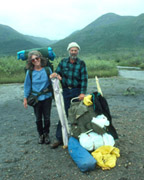Dateline Sanibel Island: Trouble In Paradise
Bert Gildart:  Though the beaches of Florida (particularly those at Sanibel) are some of the world’s most beautiful, there is now trouble in paradise. Covering some of the white sparkling sands are thick, extensive bands of algae. Unfortunately, I’m familiar with its presence for somewhat the same thing is happening to the beautiful lake near which we live, Montana’s Flathead Lake.
Though the beaches of Florida (particularly those at Sanibel) are some of the world’s most beautiful, there is now trouble in paradise. Covering some of the white sparkling sands are thick, extensive bands of algae. Unfortunately, I’m familiar with its presence for somewhat the same thing is happening to the beautiful lake near which we live, Montana’s Flathead Lake.
The process in which algae blooms occur is called eutrophication and the phenomena occurs when excessive nutrients are suddenly injected into an ecosystem. In Montana, the source is effluent from the poor and sometimes unregulated construction of septic systems. And, of course, it is also the result of huge communities now engulfing this lake once so beautiful that it was almost without peer.
Apparently, much the same is happening here, and to test my theory I visited with a volunteer at the Ding Darling National Wildlife Refuge and shared my hypothesis.
He said much debate now surrounds the problem, and that the extensive growths of red algae now covering the beach could be the result of several things. Certainly, he said, all the fertilizers used to the north to produce sugarcane could now be entering the system and injecting excessive nutrients.
Hurricane Charley might also be a culprit, for its winds stirred up nutrients on the bottom of Lake Okeechobee. In turn, these nutrients were transported down the Caloosahatchee River, which were immediately intercepted by Sanibel Island, located just a few miles off shore and directly in the path.
Yet another possibility is that wastes from cattle along the Caloosahatchee are influencing these once-pristine waters.
The problem is complex, said the long-time volunteer, and perhaps it is some combination of all these various disruptions to our ecosystem that is now causing the red algae (not to be confused with red tide, which is caused by a microscopic organism).
Because of eutrophication, a number of the beaches are covered with red algae, and if you’re in the area, and want to see for yourself, take a quick drive to Tarpon Beach or West Gulf Beach. Then ask yourself what the effects may one day be on all the beautiful shells. Could the thick bands soon cover Sanibel’s beautiful shells? Could these bands make it more difficult for the various species of birds dependent on organisms within the shells to find sustenance?
As a passing visitor/outdoor photojournalist, I don’t have the answers, and can only form opinions on what others tell me—and on what I’ve experienced in places suffering similar conditions, with which I am familiar.


January 21st, 2007 at 10:21 am
Great Article, Bert. Thanks for taking a whisper of an idea and fleshing it out with lots of facts. However the stuff is caused, it sure is inundating our beaches. You saw that yourself on Tarpon and West Gulf, and it really is kinda depressing. Good luck in the Tortugas!
January 30th, 2007 at 10:24 pm
Bert, one thing the red algae is not is Mother Nature in cycle. The evidence empirical or circumstantial s that we have allowed the commercial interests to dictate to the populace the destruction of Tarpon Bay and the beaches of Sanibel.
Up the river, where the poloticos are influenced by agrimoney, they could care less about estuarial environments. Sanibel is a pea in a huge pod when it comes to political influence; the island is predominantly the playground for the rich, non Floridian absentee owner. Take a stroll during the months of Summer and Fall, the place is a near ghost town.
Will the red algae get better? Not the right question.
Will it get worse (how can it!)?